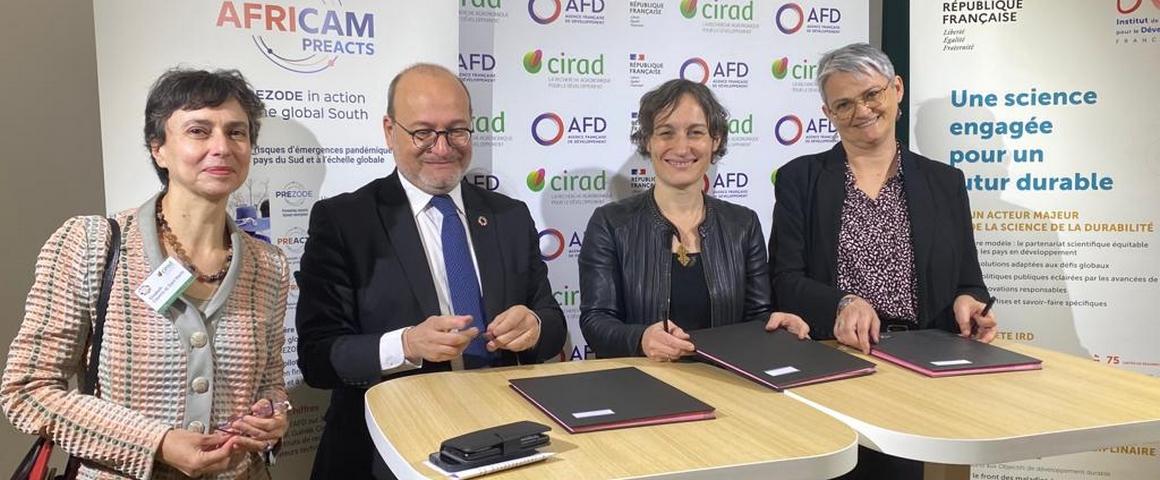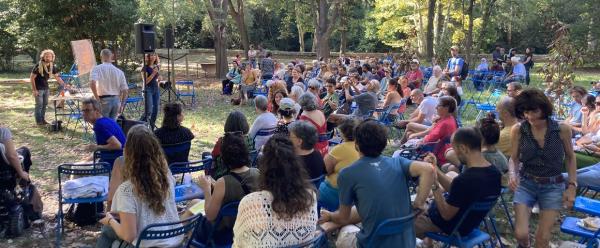Event 29 October 2025
- Home
- Press area
- Press releases
- Early detection of emerging epidemics with AfriCam
At the heart of villages, preventing the next pandemic with the AfriCam project

Official launch of the AfriCam project at the 2023 Paris International Agricultural Show, with (L to R) CIRAD CEO Elisabeth Claverie de Saint Martin, AFD CEO Rémy Rioux, Deputy Head of Sustainable Development et the Ministry for Europe and Foreign Affairs Clélia Chevrier Kolako, and Head of the Ecology, Biodiversity and Continental Ecosystem Functioning (ECOBIO) Department at IRD Emma Rochelle-Newall © N. Kaden, CIRAD
AFD, CIRAD and IRD have officially launched the AfriCam project*. The signing, which took place on Monday 27 February at the Paris International Agricultural Show, enabled AFD to grant CIRAD and IRD funding of five million euros each, with CIRAD providing overall coordination of the project.
Investing in the prevention of emergence risks
Prevention is better than cure: this is the philosophy behind the AfriCam project. For three years, the project partners will be deploying early detection systems for the emergence of zoonoses in five countries: Cambodia, Cameroon, Guinea, Madagascar and Senegal.
Through these detection systems, the ambition is to reduce this risk as much as possible in order to prevent the emergence of new epidemics.
The methodology will be resolutely participatory, in order to anchor prevention solutions in local contexts. The activities will be carried out by a large consortium of partners including public and private research operators, universities, civil society organizations and competent authorities in each of the five states.
AfriCam: putting the international PREZODE initiative into action
Launched in 2021, PREZODE (PREventing ZOonotic Diseases Emergence) brings together an international community already composed of 18 countries and 200 member organizations from the scientific, academic and associative worlds. The initiative focuses on preventing the emergence of zoonotic diseases by building resilient, sustainable and economically viable socio-ecosystems.
With the AfriCam project, PREZODE will deploy its first field activities
The initiative is based on the "One Health" approach, which includes human health, animal health and environmental health. The emergence of pathogens occurs at the level of interactions between humans, animals and ecosystems. The objective of PREZODE is to foster multilateral and multidisciplinary collaboration and knowledge sharing.
Local populations on the frontline
In the project's pilot localities, an inventory of practices will be carried out with the local populations, and in particular with breeders, in order to determine risk factors together. These very detailed analyses should, for example, answer the following questions: what types of interactions do populations have with their environment? What are the associated health impacts? How can they be reduced?
Prevention strategies will then be developed on the basis of conservation or sustainable use of biodiversity, behavioural change or uses. The living conditions of the populations will be at the heart of the concerns: the evolution of practices will not be put in place at the expense of the food security and the populations' standard of living.
For example, it is not conceivable to ban some communities from hunting wildlife for food. Consortia of partners will, instead, need to identify and propose practices that allow for the renewal of wildlife and that are less risky for humans, such as stopping the butchering of carcasses with bare hands.
Solutions adapted to local contexts to ensure the sustainability of detection systems
The fight against deforestation or against the trafficking of protected species, the supervision of bushmeat supply chains, investments in animal health, the elimination of waste that is source of contamination. Prevention strategies will be specific to the context, but also realistic and inexpensive thereby ensuring their long-term integration into public policies.
Antoine Lury, Coordinator of the AfriCam project at CIRAD: "It is essential to involve the people on the front line. Participatory surveillance, which complements traditional epidemiological surveillance, is one of the facets of this. It is a challenge, but also the key to success. Because if people have to change their practices and participate in surveillance, they will do so all the more easily if they understand what is at stake."
Marisa Peyre, AfriCam's scientific manager and coordinator of the PREZODE initiative for CIRAD: "AfriCam's activities are co-constructed with all the stakeholders, including local players, to ensure that prevention actions are relevant and that public policies adapted to different contexts are defined. This work is based on a constant science-society dialogue, which will be strengthened within the framework of the project, to better prevent and manage crises."
Benjamin Roche, PREZODE coordinator for IRD: "PREZODE aims to promote a paradigm shift towards emergence prevention by developing resilient ecosystems adapted to local specificities. AfriCam, which is the start of the global Preacts** project, is the first operational step towards changing practices on a global scale."
Matthieu Le Grix, Head of AFD's Agriculture, Rural Development and Biodiversity Division: "The AfriCam project is the first concrete expression of AFD's support for the PREZODE initiative. Environmental health, animal health, human health.... All are linked. The "One Health" approach encourages us to work on the interdependence and well-being of human populations, of living beings and more globally of the ecosystems in which we live. AfriCam will help demonstrate that prevention is everyone's responsibility and is one of our best weapons against the risk of emerging zoonotic diseases."
*AfriCam: Africa-Cambodia
** PREzode in ACTion in the global South
Preventing Zoonotic Disease Emergence initiative is a scientific and operational initiative supported by an international multidisciplinary network. Its research framework is based on the principle of co-construction from the local to the global level, in a multi-actor dynamic. Based on the "One Health" approach, which links human, animal and environmental health, the initiative aims to understand the processes and risk factors of zoonotic disease emergence, to strengthen surveillance, to improve ecosystem management, to encourage knowledge sharing and multilateral collaboration, and to be a resource centre for public policies.https://prezode.org/



























